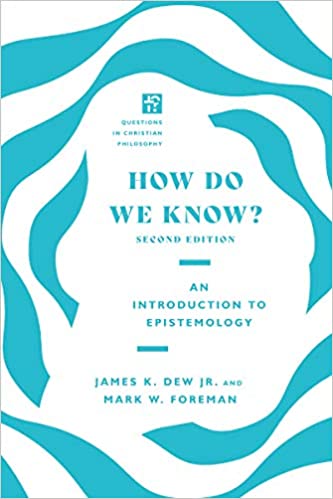A Book Review from Books At a Glance
by Steve West
Some books are written to push the boundaries of research and knowledge. Some are written to examine technical details in a subject and are only helpful for specialists. On other occasions, a book is written as an introduction to try to help non-specialists understand a difficult field. Regrettably, these latter types of books can sometimes be not only simplified but oversimplified, or the author can approach things from a very biased perspective, thus skewing the introduction to the subject. Writing a serviceable introduction to a difficult and technical field is not easy to do well, but How Do We Know? does an admirable job in serving both as a proper introduction to a difficult subject, and in being understandable and accessible.
There are all kinds of technical debates in epistemology, and there are also debates about epistemology in Christian philosophy and apologetic method. Although there are considerations that many Christian philosophers would want to bring up from their own schools and perspectives, I think it’s fair to recognize that Dew and Foreman do a commendable job presenting an introduction to epistemology from a broadly evangelical perspective. They clearly take a position as Christians, and their faith informs their assessment of the issues that they examine.
For example, they discuss the role of revelation in epistemology. Again, different schools of Christian philosophy would want to add nuances and various perspectives to their discussion, but the position they take is entirely compatible with a generic Christian view. Many debates and issues surveyed in a book like this, however, are not exclusively discussed by Christians (in the same way that political philosophy or architecture are not only discussed by Christians). Describing these debates and reporting on how various views are presented and assessed in the wider world can be done without bringing in the current author’s more nuanced and personal perspective, and this is something that Dew and Foreman do well.
One of the strengths of the book is that it blends together an analysis of historical views on epistemology with examining systems of philosophy and particular topics. The authors provide very helpful discussions about the nature of knowledge, perception, logical inferences, different epistemological theories, and much more. In fact, the authors do a consistently good job throughout each of their chapters, covering the following topics as indicated by their chapter titles:
1 What is Epistemology?
2 What is Knowledge?
3 Where Does Knowledge Come From?
4 What is Truth, and How Do We Find It?
5 What Are Inferences, and How Do They Work?
6 What Do We Perceive?
7 Do We Need Justification?
8 Can We Be Objective in Our View of the World?
9 What Is Virtue Epistemology?
10 Do We Have Revelation?
11 How Certain Can We Be?
Any thoughtful reader will learn a great deal about these epistemological topics as well as learn about major contributions from significant historical thinkers (e.g. Plato and Kant). It is a book that would serve very well as a supplementary text in an Introduction to Philosophy course. It is also very readable and relatively short, which makes it a book that students, pastors, and anyone else can benefit from and actually finish, which cannot be said for every book on philosophy!
Perhaps the success of the book can be gauged in part on how well it fulfills its purpose and aim as stated in the title. The subtitle says that it is An Introduction to Epistemology. That is precisely what I found it to be; a good one, too. For someone who is looking for the basic foundations and contours of the subject, this is a solid, accurate, and helpful place to begin. Epistemology is an extraordinarily important subject and the church ought to be conversant with it at some level. Given the strengths of this book, it is not surprising that it is in its 2nd Edition. I hope it finds a large audience.
Steve West, PhD, is pastor at Madoc Baptist Church in Madoc, Ontario. He is also adjunct professor at Toronto Baptist Seminary and an assistant editor here at Books At a Glance.
